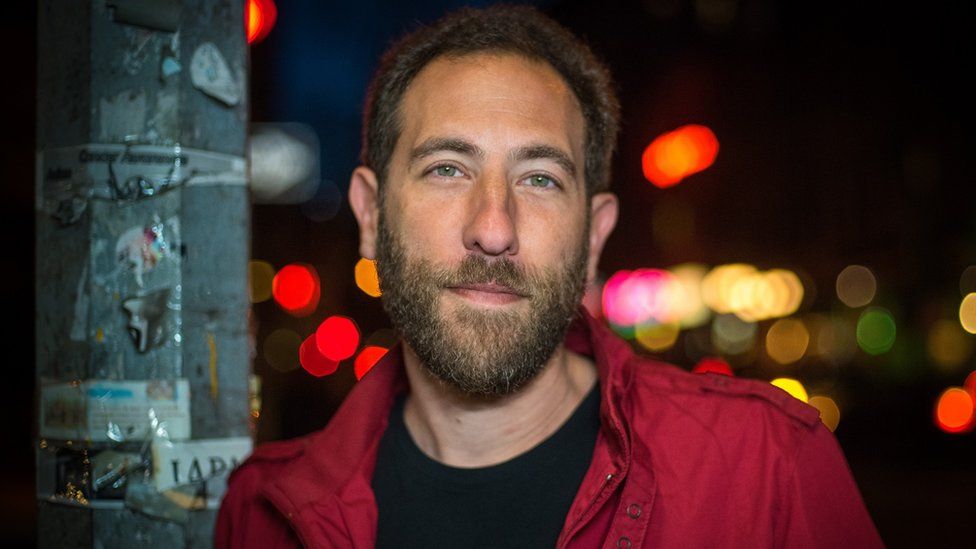Ari Shaffir: Why I ditched my smartphone
- Published
- comments

A recent report by UK regulator Ofcom claimed that 59% of Brits consider themselves to be "hooked" on their handsets - but not everybody is a slave to their smartphone, reports Zoe Kleinman.
US comedian Ari Shaffir is 15 minutes late for our interview.
"I get lost a lot," he says apologetically. He is in Scotland, performing at the Edinburgh fringe festival.
He couldn't map app his way to the BBC studio because, for the past 20 months, he has been without a smartphone.
In December 2014, Shaffir was growing concerned about the amount of time he was spending using his iPhone - especially on social media - and was considering abandoning his data plan so that he could only access the internet via wi-fi.
"I was noticing a lot of distraction on my part - constantly checking social media, not to mention email and text," he says.
"You need some of it for work and the rest is distracting you from doing your work. If you post a photo on Instagram you don't need to watch the people saying, 'Yeah I like it' - people are constantly checking their 'likes'."
So when one evening he accidentally left his handset in the back of a taxi, he decided to go cold turkey.
The first six months were difficult.
"I felt withdrawal symptoms at first, kind of the way I felt when I quit smoking," he said.
But he says he now sleeps better, talks to more people and takes more interest in his surroundings as a smartphone-free individual - and jokes that he feels "superior" to his smartphone-absorbed friends.
"I see myself as a sober alcoholic - I can't handle it," he says.
"A lot of my friends said, 'Just use [the phone] less', but that's like walking around with a pack of cigarettes in your pocket and saying just don't smoke."
Dr Andrew Przybylski, an experimental psychologist and research fellow at Oxford University's Internet Institute, thinks the comparison is a little strong.
"There is no scientific evidence that smartphones are addictive in the clinical sense," he told the BBC.
"But because they put so many possibilities at our fingertips they are very attractive."
Chocolate for the brain
Dr Przybylski added that there "isn't any good research" as yet to suggest that heavy use of social media causes changes in the brain.
"If anything, brain activation is analogous to having a good conversation with friends or having a chocolate," he added.
Shaffir is not so sure - and he is not alone. Hollywood actor Bill Murray is said never to have had a smartphone and Silicon Valley tech entrepreneur Steve Hilton has written about his decision not to own any sort of mobile phone for the last three years.
"I find the idea that we should all be connected and contactable all the time not just bizarre but menacing," said Mr Hilton, a former adviser to David Cameron.
He admitted to borrowing other people's phones "four or five times a month".
"That's the sum total of the times I find I really need a phone's functionality," he wrote.
Meanwhile Ann Makosinski gave a TEDx Teen talk at the age of 18 about never owning a smartphone.
Like many others, the young Canadian inventor argued that they stifle creativity.
"Creativity was born out of necessity because I didn't have many things to play with," she said of her childhood.
"I think in terms of creativity these technologies are a net positive," said Dr Przybylski.
"Looking at the way that younger people use Snapchat and apps to create mash-ups is probably a step forward."
Tech etiquette
For Ari Shaffir, the constant attention demanded by handsets needs rebalancing.
"It's every moment of your life," he says.
"There needs to be an etiquette built around it and we haven't built it yet."
Perhaps that revolution is under way.
A cocktail bar in East Sussex has "banned" mobile devices by building a Faraday Cage into its walls to block phone signals and Apple has patented technology to prevent smartphone cameras from working at concerts.
Meanwhile, Shaffir is now using a six-year-old Samsung Gravity 3.
"It can text, you can make the font bigger or smaller, and it has over 10 different ring tones," he jokes.
"You cannot get on email, you cannot get on any website. You can tweet via your texting, you just can't check responses."
'More smartphones than people'
Should the smartphone industry be worried? Analyst Ben Wood from CCS Insight doesn't think so.
"The smartphone has become part of the fabric of today's society," he said.
"It is the most prolific consumer electronics device on the planet and it seems most people can't live without one.
"As if to underline how pervasive they are as a phenomenon we've now reached a point that there are more smartphones than people in the UK. It seems like the whole population is hooked."
- Published4 August 2016
- Published4 August 2016
- Published30 June 2016
- Published31 August 2015